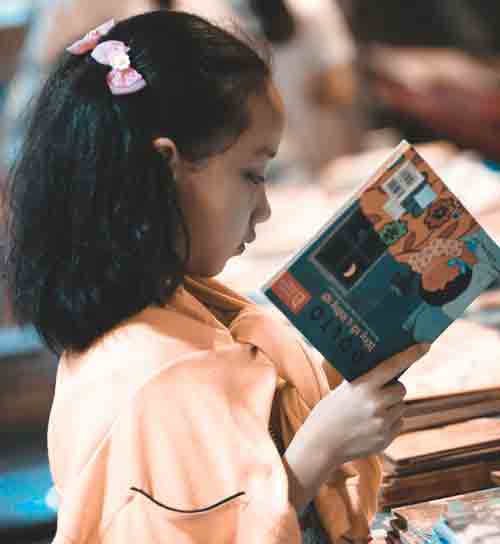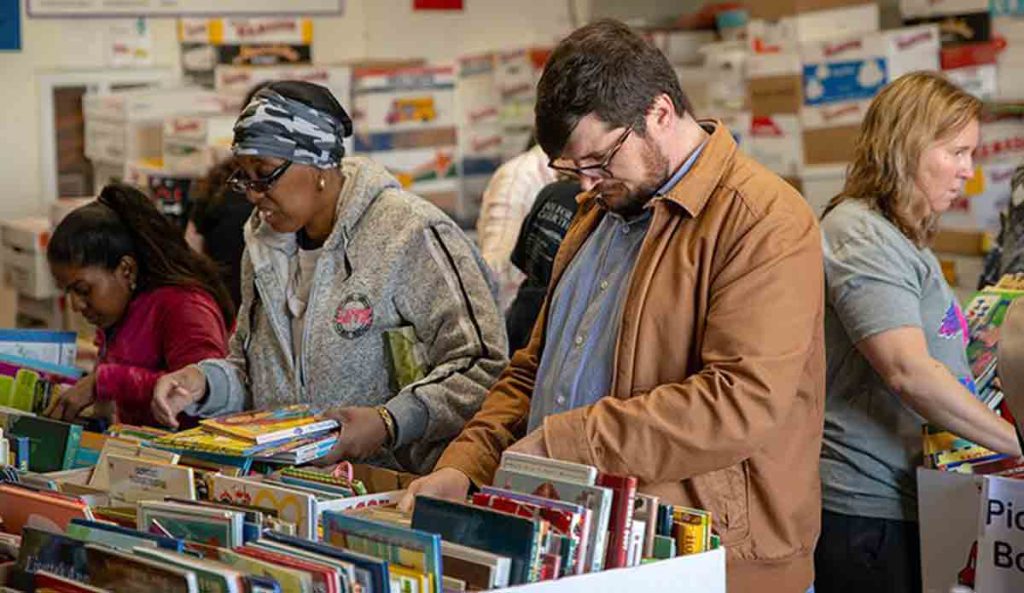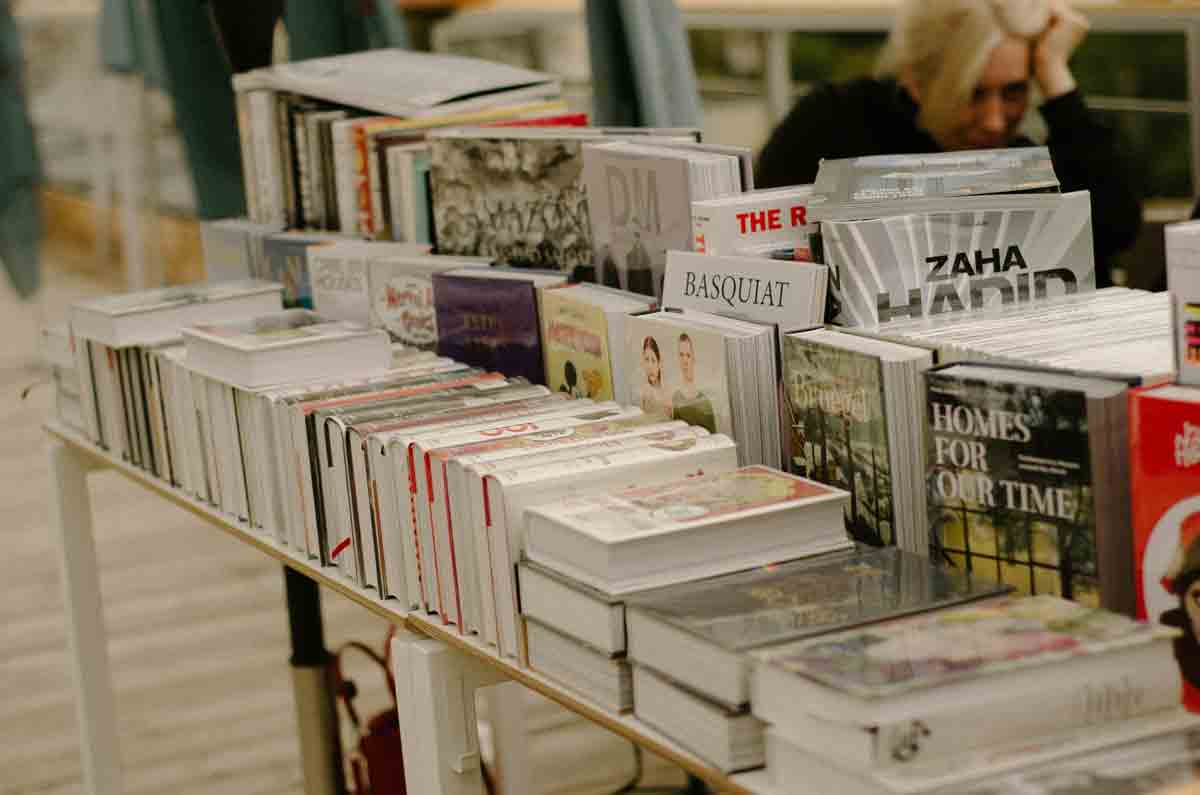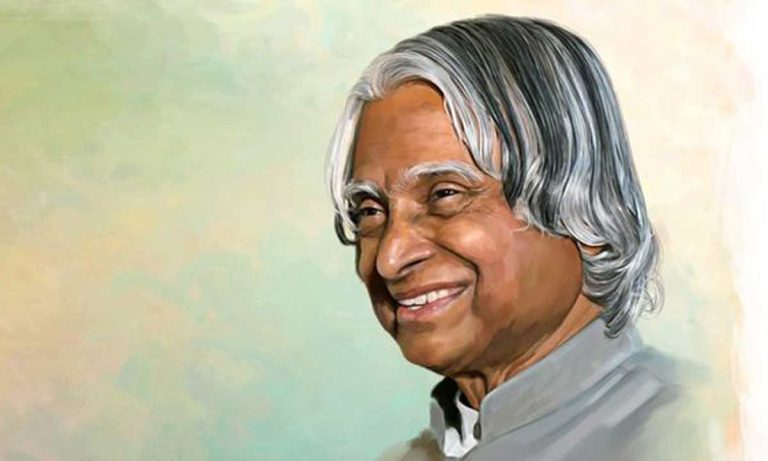Paragraph On Book Fair – Very Unique
A book fair is a unique event designed to showcase and sell various books. In my paragraph on the book fair, I’ll tell you everything about it—what it is, the benefits, and more. This will also help you write your own book fair paragraph.
So let’s get started.

Paragraph On Book Fair 100 Words
A book fair is an exciting event to dive into a world of knowledge and imagination! It’s like a gem filled with books of all kinds, waiting to be explored. At a book fair, you can discover fascinating facts about history, science, and nature or embark on thrilling adventures in far-off lands. You can also meet authors who bring their stories to life and learn how books are made.
With activities like storytelling and creative workshops, a book fair is fun and a great place to learn new things and spark your curiosity about the world around you.
So, grab your backpack and prepare for a discovery journey at the next book fair!
Paragraph On Book Fair 150 Words
A book fair is a vibrant congregation of literature enthusiasts, authors, publishers, and book vendors, offering diverse literary treasures. Upon entering, one is greeted by rows of stalls adorned with colorful displays, each beckoning with promises of knowledge and adventure.
Books of various genres, from fiction to non-fiction, classics to contemporary bestsellers, line the shelves, catering to every taste and interest. Visitors can browse many titles, discover hidden gems, or indulge in long-awaited releases.
The atmosphere buzzes with excitement as people engage in conversations about their favorite authors or eagerly anticipate book signings and author talks. Besides fostering a love for reading and promoting literacy, book fairs serve as platforms for cultural exchange and intellectual discourse. They provide opportunities for emerging authors to showcase their work and for readers to connect with like-minded individuals.
Additionally, book fairs contribute to the local economy by supporting publishers and bookstores. In essence, book fairs are not just marketplaces for books; they are celebrations of the written word and their profound impact on individuals and societies.
Paragraph On Book Fair 200 Words
Book fairs are events and vibrant celebrations of literature, knowledge, and imagination. From the moment you step into the bustling aisles, you’re transported to a realm of stories, where every corner holds a new adventure waiting to be explored. The air buzzes with excitement as crowds weave through the maze of tents, each one a treasure trove of literary delights. From the towering shelves of classic tomes to the sleek displays of modern masterpieces, the fair is a vibrant celebration of the written word in all its forms.
Here, literature isn’t just a commodity; it’s a living, breathing entity that captivates the imagination and stirs the soul. The scent of ink and paper mingles with the sounds of animated conversations, creating an atmosphere of shared passion and discovery. Every genre, from fantasy to romance to science fiction, finds its place among the rows of books, each beckoning readers to delve into its pages and lose themselves in its world.
But the book fair is more than just a marketplace—it’s a haven for book lovers, a sanctuary where bibliophiles can come together to celebrate their shared love of reading. It’s a place where dreams are born, imaginations run wild, and where the magic of storytelling knows no bounds. In this bustling tapestry of words, readers find new books and a renewed sense of wonder and appreciation for the transformative power of literature.
Book Fair Paragraph 250 Words
Imagine a place where books come to life, where people can meet their favorite authors, discover new tales, and make friends who share your love of reading. That’s the magic of a book fair! It’s like stepping into a world of wonder, where every corner holds a new adventure.
At the book fair, there are rows and rows of colorful stalls, each filled with books just waiting to be explored. From exciting adventures to funny stories and everything in between, there’s a book for everyone. People can let their imagination soar as they browse through the aisles, picking out stories that catch their eye and whisking them away to far-off lands.
But the fun doesn’t stop there! There are chances to meet the authors behind the stories. People can sit down with their favorite writers, asking them questions about their characters and the magical worlds they’ve created. It’s a chance to peek behind the curtain and see how books are made.
And don’t forget about all the activities! From storytelling sessions where anyone can listen to tales told by amazing storytellers to workshops where anyone can learn how to write and illustrate their own stories, there’s always something exciting happening at the book fair. It’s easy to make some new friends who love books too.
If anyone ever gets the chance to visit a book fair, be sure to grab it with both hands. It’s a journey never to forget, filled with stories, laughter, and the joy of discovering new worlds on the pages of a book.
In-depth information about a Book Fair, so that you can write your own paragraph on it.
What is a Book Fair?

Various publishers, authors, and enthusiasts gather to showcase and sell books to the public at a book fair. It’s a vibrant celebration of literature, knowledge, and creativity.
Book fairs serve multiple purposes. They provide a platform for authors and publishers to promote their work, allowing them to reach a wider audience. Additionally, book fairs encourage reading and literacy by offering a diverse selection of books to explore and purchase.
Why Is Book Fair Important?
Book fairs promote a love for reading and learning within communities. They promote cultural exchange, intellectual engagement, and the appreciation of literature. Furthermore, book fairs contribute to the growth of the publishing industry by facilitating book sales and networking opportunities.
Which Books Are Usually Sold At The Book Fair?
Book fairs typically offer many books, including fiction, non-fiction, children’s literature, academic texts, graphic novels, and more. The selection often reflects the diverse interests and preferences of the attendees.
How Book Fair is Celebrated?
Book fairs are enthusiastically celebrated. They may feature author signings, panel discussions, book readings, workshops, and interactive activities for attendees of all ages. Food stalls, live music, and cultural performances often add to the festive atmosphere.
What Kind of People Comes to Book Fair?
People from all walks of life attend book fairs. This includes avid readers, students, educators, scholars, authors, publishers, librarians, and literary enthusiasts. Book fairs attract individuals who share a passion for literature and a curiosity for new ideas and perspectives.
What Do People Do in Book Fairs?
At book fairs, attendees engage in a variety of activities, making them vibrant and engaging events:
1. Browsing and Purchasing Books:
Attendees explore the diverse array of books on display, from bestsellers to niche publications, and have the opportunity to purchase them directly from publishers and vendors.
2. Author Signings and Meet-and-Greets:
Many book fairs feature sessions where authors sign copies of their books and interact with readers, offering fans a unique chance to meet their favorite writers.
3. Panel Discussions and Talks:
Panels and discussions cover various topics, including literature, publishing trends, social issues, and more, often featuring authors, industry professionals, and experts.
4. Workshops and Writing Seminars:
Some book fairs offer workshops and seminars on writing, publishing, and related topics, providing valuable insights and guidance for aspiring authors and industry professionals.
5. Literary Performances and Readings:
Attendees can enjoy literary performances, poetry readings, and storytelling sessions, showcasing the richness and diversity of literary expression.
6. Children’s Activities:
Many book fairs include special activities and events for children, such as storytelling sessions, puppet shows, arts and crafts, and interactive exhibits, fostering a love of reading from a young age.
Is the Book Fair Worth It?
Whether a book fair is worth attending depends on individual preferences and objectives. Here are some factors to consider:
– Access to Books:
Book fairs offer access to a wide range of books, including new releases, bestsellers, and niche titles, often at discounted prices.
– Author Interactions:
Meeting authors and attending book signings can be a memorable experience for fans and aspiring writers alike.
– Networking Opportunities:
Book fairs provide opportunities to network with fellow book lovers, authors, publishers, and industry professionals, potentially leading to new connections and collaborations.
– Educational Value:
Panels, workshops, and seminars offer educational and professional development opportunities, allowing attendees to learn from experts in the field.
– Community Engagement:
Book fairs contribute to community engagement and cultural enrichment, fostering a sense of belonging and shared appreciation for literature.
Ultimately, whether a book fair is worth attending depends on one’s interests, goals, and enjoyment of literary events. Attending a book fair can be a rewarding and enriching experience for avid readers, aspiring writers, and industry professionals.
List of Biggest Book Fairs in this World
| Book Fair | Location | Frequency | Date | Key Features |
|---|---|---|---|---|
| Abu Dhabi International Book Fair | Abu Dhabi, UAE | Annual | Usually in April | Focus on Arabic language, Middle Eastern, and North African publishers |
| BookExpo America (BEA) | Various cities, USA | Annual | Varies (typically in June) | Largest annual book trade event in the USA |
| Frankfurt Book Fair | Frankfurt, Germany | Annual | October | World’s largest trade fair for books |
| Guadalajara International Book Fair | Guadalajara, Mexico | Annual | Late November – Early December | Principal event for Spanish-language publishing |
| The Hong Kong Book Fair | Hong Kong | Annual | Usually in July | Asia’s biggest book fair with diverse cultural activities |
| London Book Fair | London, UK | Annual | Varies (typically in March) | Second only to Frankfurt in Europe |
| New Delhi World Book Fair | New Delhi, India | Annual | Usually in January or February | Third biggest English Language book fair in the world |
| Ekushey Book Fair | Dhaka, Bangladesh | Annual | February | One of the largest book fairs in Bangladesh, celebrates the Language Movement Day |

History Of Book Fair
The history of book fairs dates back centuries, evolving from humble beginnings into the grand events we know today. Here’s a brief overview:
Early Beginnings:
- Medieval European Markets: Book fairs trace their roots to medieval European markets where books were among the goods traded alongside other commodities.
- Frankfurt Book Fair: One of the earliest and most renowned book fairs, the Frankfurt Book Fair traces its origins to the Middle Ages when local booksellers gathered annually to exchange manuscripts.
Renaissance and Enlightenment:
- Venetian Book Fairs: During the Renaissance, Venice emerged as a prominent hub for book trade, hosting regular book fairs where publishers showcased their latest works.
- Paris Book Fair: The Paris Book Fair, also known as the Salon du Livre, has a long history dating back to the 16th century, where it initially focused on religious and philosophical texts.
Modern Developments:
- Expansion of the Publishing Industry: The rise of the printing press in the 15th century revolutionized book production, expanding the publishing industry and the proliferation of book fairs.
- Internationalization: In the 20th century, book fairs became more international in scope, with events like the London Book Fair and the BookExpo America attracting participants from around the world.
- Diversification of Offerings: Over time, book fairs diversified their offerings to include not only books but also other forms of media such as e-books, audiobooks, and digital content.
- Community Engagement: Modern book fairs also focus on community engagement, offering various activities, workshops, and author signings to attract a broader audience and promote literacy.
Contemporary Trends:
- Digitalization: With the advent of digital technology, some book fairs have incorporated virtual components, allowing for online participation and digital book exhibitions.
- Sustainability: There’s a growing emphasis on sustainability in book fairs, with efforts to reduce waste and environmental impact through initiatives such as eco-friendly printing and packaging.
- Inclusivity: Book fairs increasingly strive to be inclusive spaces that showcase diverse voices and perspectives across genres and cultures.
Overall, the history of book fairs reflects the enduring significance of literature and the ongoing evolution of the publishing industry in bringing people together to celebrate the written word.
How to Organize a Book Fair?
Organizing a book fair can be rewarding, bringing together literature enthusiasts and fostering a love for reading within your community. Here’s a step-by-step guide to help you organize a successful book fair:
1. Establish Goals and Objectives:
Determine the purpose of your book fair, whether it’s to promote literacy, raise funds for a cause, or support local authors and publishers.
2. Form a Planning Committee:
Assemble a team of volunteers to help organize and execute the book fair. Assign roles and responsibilities based on each member’s strengths and interests.
3. Set a Budget:
Determine your budget for venue rental, marketing materials, book purchases, and other expenses. Seek sponsorships or partnerships to help offset costs if needed.
4. Choose a Venue and Date:
Select a suitable venue accommodating vendors, attendees, and various activities. Ensure the date doesn’t conflict with other major events and allows ample time for planning.
5. Recruit Vendors and Participants:
Reach out to publishers, authors, bookstores, and other potential vendors to secure their participation in the book fair. Provide them with information about the event and any requirements for participation.
6. Promote the Event:
Use various marketing channels, such as social media, posters, flyers, and local newspapers, to promote the book fair and generate excitement. Highlight featured authors, book signings, and special activities.
7. Plan Activities and Entertainment:
Create a schedule of activities, including author readings, panel discussions, workshops, and children’s activities. Consider incorporating literary performances, book-themed contests, and interactive exhibits to engage attendees.
8. Organize Logistics:
Arrange for tables, chairs, signage, and other necessary equipment for the event. Coordinate logistics such as transportation, parking, security, and accessibility to ensure a smooth experience for participants.
9. Execute the Event:
On the day of the book fair, ensure everything is set up according to plan. Welcome attendees, facilitate activities, and address any issues or concerns during the event.
10. Collect Feedback and Evaluate:
After the book fair, gather participant, vendor, and volunteer feedback to assess the event’s success. Identify areas for improvement and lessons learned to improve future book fairs.
How Do I Participate in the Book Fair as a Student?
Participating in a book fair as a student can be a rewarding experience that fosters a love for reading and learning. Here’s how you can get involved:
1. Attend as a Visitor:
Visit the book fair to explore the diverse selection of books, attend author readings and workshops, and engage in literary activities and discussions.
2. Volunteer:
Offer to volunteer at the book fair to assist with tasks such as setting up booths, guiding attendees, organizing activities, or helping with book sales.
3. Organize a Student Booth:
Collaborate with your classmates or school club to set up a student booth at the book fair if allowed. Showcase student-written works, artwork, or literary projects to share with the community.
4. Participate in Competitions or Contests:
Look for book-themed competitions or contests organized as part of the book fair, such as writing contests, storytelling competitions, or literary quizzes.
5. Promote Literacy Initiatives:
Take the opportunity to promote literacy initiatives or book drives at your school or community by raising awareness and encouraging participation among attendees.
6. Network and Learn:
At the book fair, you can engage with authors, publishers, and other industry professionals to learn more about the world of publishing, writing, and literature.
7. Share Your Experience:
After attending the book fair, share your experience with your peers, teachers, and family. Discuss your favorite books, authors, and event highlights to inspire others to participate in future book fairs.
Conclusion
From this book fair paragraph, it can be concluded that book fair provides a vibrant platform for authors, publishers, and enthusiasts to celebrate literature. It is a hub for literary exchange, fostering connections between writers and readers while showcasing the latest literary works.
The fair promotes a culture of reading and learning through engaging activities, insightful discussions, and diverse exhibitors. With its enriching experiences and opportunities for discovery, the book fair continues to be a cornerstone of the literary community, inspiring and delighting attendees of all ages.







